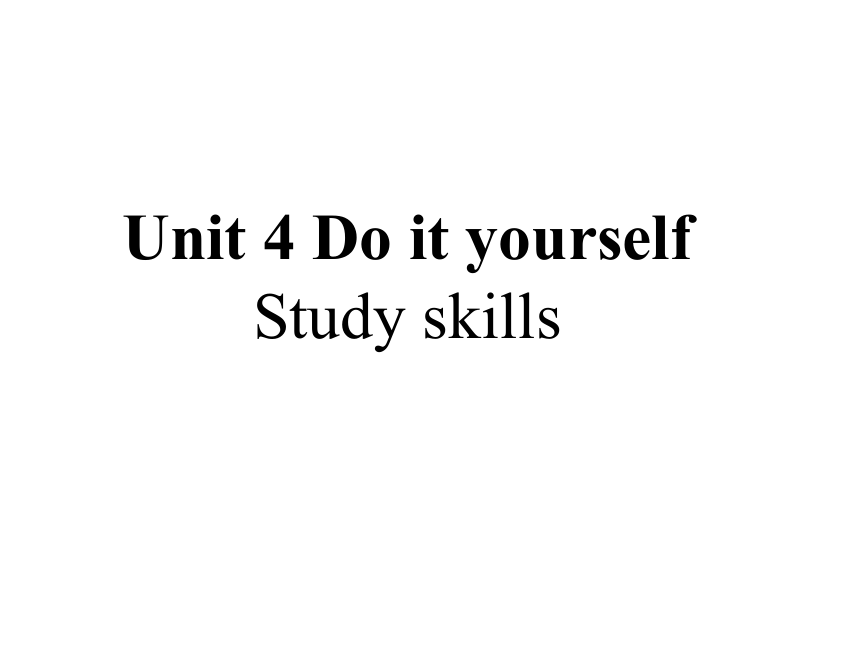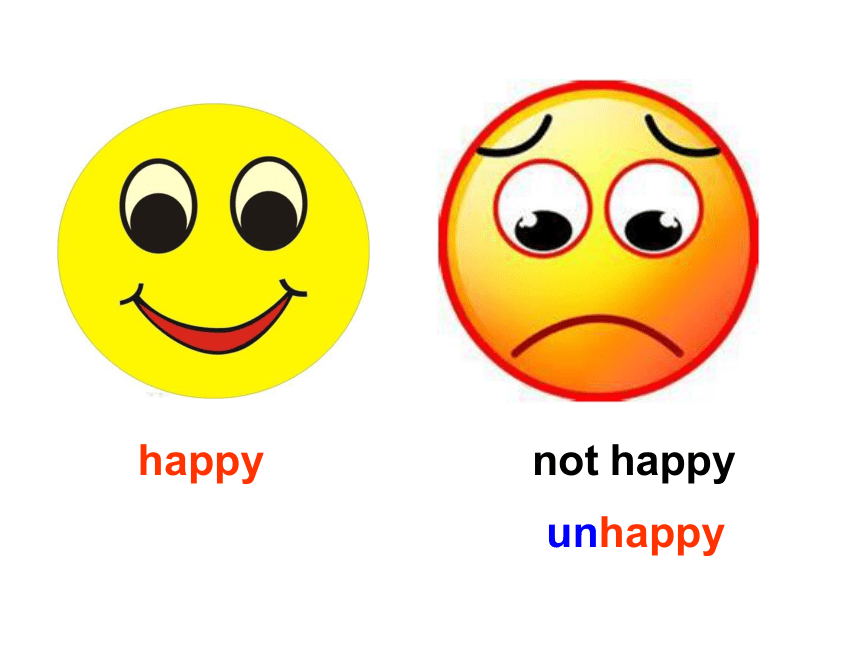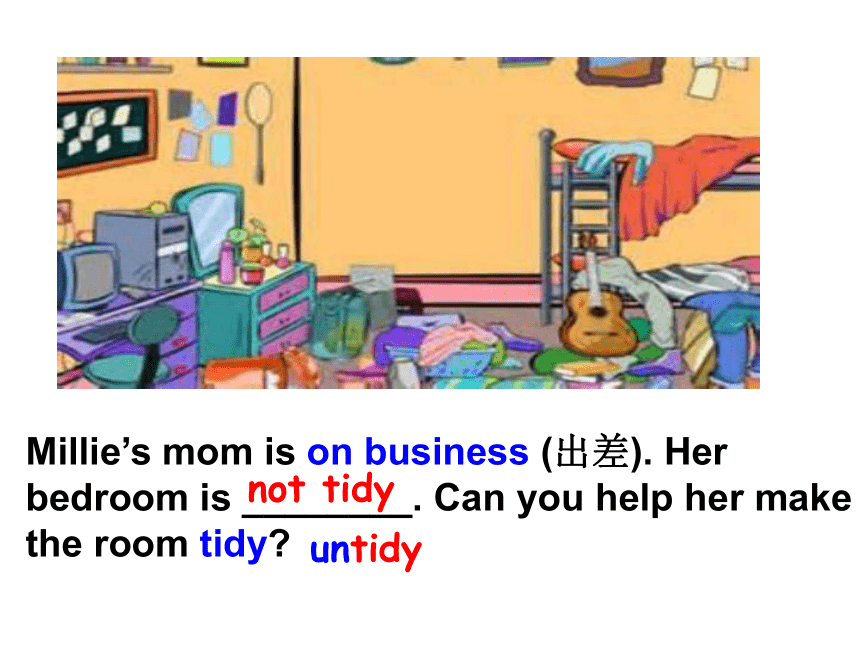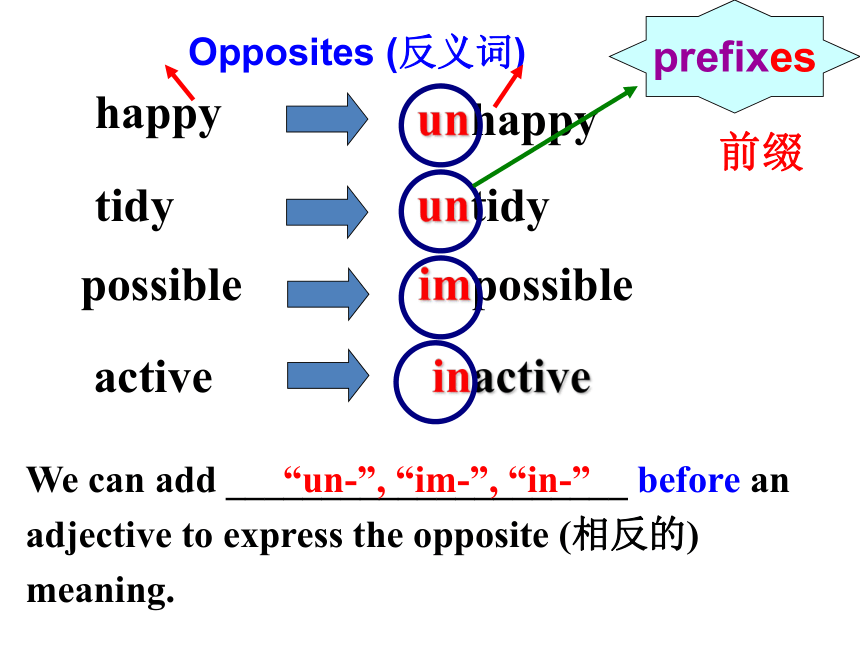牛津译林版八年级英语上册课件Unit 4 Do it yourself Study kills课件 (共27张PPT)
文档属性
| 名称 | 牛津译林版八年级英语上册课件Unit 4 Do it yourself Study kills课件 (共27张PPT) |  | |
| 格式 | zip | ||
| 文件大小 | 1.9MB | ||
| 资源类型 | 教案 | ||
| 版本资源 | 牛津译林版 | ||
| 科目 | 英语 | ||
| 更新时间 | 2022-10-15 08:48:41 | ||
图片预览









文档简介
(共27张PPT)
Unit 4 Do it yourself
Study skills
The boys like playing basketball.
They are active in doing sports.
But they are _________ in study.
not active
inactive
happy
unhappy
not happy
I will finish my homework as much as possible, but it’s ____________ for me to finish all of it.
impossible
not possible
Millie’s mom is on business (出差). Her bedroom is ________. Can you help her make the room tidy
untidy
not tidy
untidy
possible
impossible
happy
unhappy
active
inactive
Opposites (反义词)
tidy
prefixes
前缀
We can add _____________________ before an adjective to express the opposite (相反的) meaning.
“un-”, “im-”, “in-”
For most of the adjectives, we add “un-” to make it opposite.
friendly
happy
comfortable
certain
tidy
able
fair
lucky
usual
unfriendly
unhappy
uncomfortable
uncertain
untidy
unable
unfair
unlucky
unusual
Rules
If the adjective begins with “p”, we usually add “im-” before it.
polite
possible
patient
possible
impolite
impossible
impatient
impossible
Rules
But: pleasant unpleasant
expensive
correct
active
direct
inexpensive
incorrect
inactive
indirect
Rules
But some adjectives are special. You should add “in-” before them to make the opposite meaning.
1.____friendly 2.____happy
3.____correct 4.____polite
5.____comfortable 6.____expensive ____healthy 8.____possible
9.____tidy 10.____certain
11.____patient 12.____able
13.
7.
Check your memory!
un
un
un
un
un
un
un
im
im
im
in
in
___regular
14.___honest
ir
dis
We can add before an adjective to express the opposite meaning.
“ir-” or “dis-”
1. Annie: Do you spend a lot of time doing outdoor
sports
Simon: Sure. It’s usual for me to stay at home all day.
2. Sandy: Our neighbour next door is putting something
on the wall.
Mum: It’s possible to sleep with all that noise.
unusual
impossible
Read the conversation. Add the correct prefixes
to the adjectives so that all the sentences make sense.
3. Millie: Are you able to fix your bicycle, Andy
Andy: No. I’m certain that I can fix it myself.
4. Mum: Suzy, your room is really tidy—things
are all over the floor.
Suzy: Sorry, Mum. I’ll tidy up right now.
uncertain
untidy
Discussion
How should we behave in class or in school
We should be _____________ to others.
We should be _________________ to the classmates in need.
We should not be _________ in sports.
We had better not make our classroom ___________.
We had better not wear ______________________ clothes at school.
friendly/kind
patient/helpful
inactive
untidy
untidy/uncomfortable
Tommy and Leo are twin brothers. They look so much alike that people are ______ to tell them at first sight.
If one knows them well, it’s easy to tell them apart.
Tommy likes smiling. He is patient and willing to help others. However, Leo looks ________, for he ______ smiling and never greets others. When his classmates ask him questions, he is _______ and _______ to answer them. It is ______________________ for Leo to behave that way. Leo looks ___________________
because no one wants to make friends with him. He thinks it is _____ for his classmates to treat him so coldly.
If Leo stops doing those _______ things, people will
find it _______ to differentiate Leo and Tommy
unfriendly
unhappy/uncomfortable
improper/impolite/incorrect
unfair
dislikes
impatient
unwilling
unable
improper
impossible
Fill in the blanks with adjectives with prefixes un-,in-, im- and dis-.
1
3
2
4
5
6
7
8
9
Playing a game: a magic box
Here is a magic box with nine cards, and under each card there is a task for you to finish. Choose any of them and finish the task. After you finish all the tasks, there is a big surprise for you!
It’s ___________ (舒服的) to sit in it.
It’s ________________
(不舒服的) to sit on it.
comfortable
uncomfortable
The boy is not very strong, for he is always ___ in sports.
A. inactive B. active
A
not direct _______
not kind _______
not possible _______
indirect
unkind
impossible
unusual
The snow is so heavy. It is _________ to
see such heavy snow. That is, the snow is
much heavier than usual.
This isn’t an important thing.
=
This is an ________ thing.
unimportant
It is imcorrect to read someone else’s
letter.
2. David often says bad words to others,
so he is inwelcome.
3. It’s infriendly to throw stones at
birds.
incorrect
unwelcome
unfriendly
Correct the mistakes:
Can you remember the rules
We can add __________________
_______ (before/after) an adjective to
express the opposite meaning.
“un-”, “in-”, “ im-”
before
Work out the rule!
1.________ 是最常用的否定前缀。
2.否定前缀________常用在以字母c开头的单词前,
3.否定前缀________常用在以字母p 开头的单词前。
“un-”
“in-”
“im-”
从来都不会用在以字母l、r开头的单词前。
、b、m
Summary
1. For most of the adjectives, we add “un-” to
make it opposite.
unkind, unhappy, unlucky …
2. If the adjective begins with “p”, we usually add
“im-” before it.
impossible, impolite …
3. Some adjectives are special. You should add
“ in-” before them to make the opposite
meaning.
incorrect, inactive …
选词填空:
1. Some people are ___________ ( friendly, unfriendly) to birds. They throw stones to them.
2. Some people feel _________ (happy, unhappy) that government give poor people such small and _____________(comfortable, uncomfortable) flats.
3. It is _______ (safe, unsafe) to walk alone on the street at night.
4. We should keep students staying away from the ________ (healthy, unhealthy) books.
unfriendly
unhappy
uncomfortable
unsafe
unhealthy
1. Remember all the negative
prefixes.
2. Try to find out some other
negative prefixes.
3. Preview Task.
Homework
Unit 4 Do it yourself
Study skills
The boys like playing basketball.
They are active in doing sports.
But they are _________ in study.
not active
inactive
happy
unhappy
not happy
I will finish my homework as much as possible, but it’s ____________ for me to finish all of it.
impossible
not possible
Millie’s mom is on business (出差). Her bedroom is ________. Can you help her make the room tidy
untidy
not tidy
untidy
possible
impossible
happy
unhappy
active
inactive
Opposites (反义词)
tidy
prefixes
前缀
We can add _____________________ before an adjective to express the opposite (相反的) meaning.
“un-”, “im-”, “in-”
For most of the adjectives, we add “un-” to make it opposite.
friendly
happy
comfortable
certain
tidy
able
fair
lucky
usual
unfriendly
unhappy
uncomfortable
uncertain
untidy
unable
unfair
unlucky
unusual
Rules
If the adjective begins with “p”, we usually add “im-” before it.
polite
possible
patient
possible
impolite
impossible
impatient
impossible
Rules
But: pleasant unpleasant
expensive
correct
active
direct
inexpensive
incorrect
inactive
indirect
Rules
But some adjectives are special. You should add “in-” before them to make the opposite meaning.
1.____friendly 2.____happy
3.____correct 4.____polite
5.____comfortable 6.____expensive ____healthy 8.____possible
9.____tidy 10.____certain
11.____patient 12.____able
13.
7.
Check your memory!
un
un
un
un
un
un
un
im
im
im
in
in
___regular
14.___honest
ir
dis
We can add before an adjective to express the opposite meaning.
“ir-” or “dis-”
1. Annie: Do you spend a lot of time doing outdoor
sports
Simon: Sure. It’s usual for me to stay at home all day.
2. Sandy: Our neighbour next door is putting something
on the wall.
Mum: It’s possible to sleep with all that noise.
unusual
impossible
Read the conversation. Add the correct prefixes
to the adjectives so that all the sentences make sense.
3. Millie: Are you able to fix your bicycle, Andy
Andy: No. I’m certain that I can fix it myself.
4. Mum: Suzy, your room is really tidy—things
are all over the floor.
Suzy: Sorry, Mum. I’ll tidy up right now.
uncertain
untidy
Discussion
How should we behave in class or in school
We should be _____________ to others.
We should be _________________ to the classmates in need.
We should not be _________ in sports.
We had better not make our classroom ___________.
We had better not wear ______________________ clothes at school.
friendly/kind
patient/helpful
inactive
untidy
untidy/uncomfortable
Tommy and Leo are twin brothers. They look so much alike that people are ______ to tell them at first sight.
If one knows them well, it’s easy to tell them apart.
Tommy likes smiling. He is patient and willing to help others. However, Leo looks ________, for he ______ smiling and never greets others. When his classmates ask him questions, he is _______ and _______ to answer them. It is ______________________ for Leo to behave that way. Leo looks ___________________
because no one wants to make friends with him. He thinks it is _____ for his classmates to treat him so coldly.
If Leo stops doing those _______ things, people will
find it _______ to differentiate Leo and Tommy
unfriendly
unhappy/uncomfortable
improper/impolite/incorrect
unfair
dislikes
impatient
unwilling
unable
improper
impossible
Fill in the blanks with adjectives with prefixes un-,in-, im- and dis-.
1
3
2
4
5
6
7
8
9
Playing a game: a magic box
Here is a magic box with nine cards, and under each card there is a task for you to finish. Choose any of them and finish the task. After you finish all the tasks, there is a big surprise for you!
It’s ___________ (舒服的) to sit in it.
It’s ________________
(不舒服的) to sit on it.
comfortable
uncomfortable
The boy is not very strong, for he is always ___ in sports.
A. inactive B. active
A
not direct _______
not kind _______
not possible _______
indirect
unkind
impossible
unusual
The snow is so heavy. It is _________ to
see such heavy snow. That is, the snow is
much heavier than usual.
This isn’t an important thing.
=
This is an ________ thing.
unimportant
It is imcorrect to read someone else’s
letter.
2. David often says bad words to others,
so he is inwelcome.
3. It’s infriendly to throw stones at
birds.
incorrect
unwelcome
unfriendly
Correct the mistakes:
Can you remember the rules
We can add __________________
_______ (before/after) an adjective to
express the opposite meaning.
“un-”, “in-”, “ im-”
before
Work out the rule!
1.________ 是最常用的否定前缀。
2.否定前缀________常用在以字母c开头的单词前,
3.否定前缀________常用在以字母p 开头的单词前。
“un-”
“in-”
“im-”
从来都不会用在以字母l、r开头的单词前。
、b、m
Summary
1. For most of the adjectives, we add “un-” to
make it opposite.
unkind, unhappy, unlucky …
2. If the adjective begins with “p”, we usually add
“im-” before it.
impossible, impolite …
3. Some adjectives are special. You should add
“ in-” before them to make the opposite
meaning.
incorrect, inactive …
选词填空:
1. Some people are ___________ ( friendly, unfriendly) to birds. They throw stones to them.
2. Some people feel _________ (happy, unhappy) that government give poor people such small and _____________(comfortable, uncomfortable) flats.
3. It is _______ (safe, unsafe) to walk alone on the street at night.
4. We should keep students staying away from the ________ (healthy, unhealthy) books.
unfriendly
unhappy
uncomfortable
unsafe
unhealthy
1. Remember all the negative
prefixes.
2. Try to find out some other
negative prefixes.
3. Preview Task.
Homework
